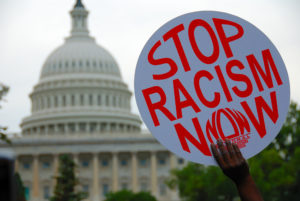HUMANISM 101 | Racism by Numbers and the Battle Ahead

Overt racism, nativism, loss of compassion, and hate speech are on the rise. All of our highest humanist values are under attack. Racial fear and resentment are being used to manipulate the 2018 midterm elections that are upon us and may determine whether we’ll see a further sabotaging of civilization. Dog-whistle racism has descended to bullhorn racism.
The key function of ethics is to recognize our duties to each other, to widen our circles of compassion, and to affirm the inherent worth and dignity of each person. This doesn’t mean we’re all exactly the same, but we have a core of shared humanity. It’s hard work, especially for privileged white people in the United States, to live up to these values, as we have instincts for tribalism, racism, and general fear of the “other.” Our instincts then nurture a racist culture.
Consider a few brutal statistics regarding racism in America:
- Job applicants with white-sounding names elicit 30 percent more callbacks than equally qualified candidates with African-American-sounding names, as reported in a 2003 study published in the American Economic Review. More recent research out of Harvard (2017) found hiding your ethnic details on your resume improved your chance of a callback from 11 percent to 25 percent.
- 12.9 percent of black college graduates were unemployed compared with an unemployment rate that stood at just 5.2 percent in 2018 in a study by the Center for Economic and Policy Research.
- The Brookings Institution reported in 2017 that black students were three times more likely to be suspended than white students, even when their infractions were similar. Once black children are in the criminal justice system, they are eighteen times more likely than white children to be sentenced as adults according to the 2017 Sentencing Project.
- Black Americans make up 13 percent of the US population; they represent about 34 percent of the prison inmates. When black people are convicted, they are about 20 percent more likely to be sentenced to jail time, and typically see sentences 20 percent longer than those for whites who were convicted of similar crimes according to the US Department of Justice Sentencing Commission in 2017.
- In 2015 the Justice Department found that black drivers are about 30 percent more likely than whites to be pulled over by the police. African Americans are twice as likely to have a vehicle searched, but 26 percent less likely to have contraband found.
- The median white family has $111,146 in family wealth compared to $7,173 in median black family wealth according to 2014 United States Census Bureau statistics.
- African Americans comprise 14 percent of regular drug users, but are 37 percent of those arrested for drug offenses by the Justice Department.
- According to 2012 FBI data compiled by Vox, black people were less than 13 percent of the US population, but 39 percent of those killed by police (when not attacking).
- It’s been widely reported for years that one in three black men in the US can expect to go to jail at some point in their lifetimes—one in four may be more accurate and still significant.
Much more could be listed, but we see here the results of fear-based racism in America. Awareness of white privilege and systemic racism is fundamental, but we need solutions. I am absolutely convinced that if we are to achieve the humanist moral goal of affirming the inherent worth and dignity of all people, that the solution is imagination. We are called to get by our instinctual and learned fear of the “other” by “seeing” the other person’s humanity. It requires an intentional awareness. None of us are immune to the emotional pull of fear of the other. All of us are uncomfortable, some even repelled, by the appearance of some people. It’s human nature, especially if others don’t look like your tribe.
All of us can learn more about our own privilege and our own prejudices that are always lurking in our minds. It takes courage, self-examination, and education, starting at a young age. The 2018 midterm elections will test our ability to see through the political racism that has worked so well in the past, will be in our faces, and is not just a racist attack but an attack on all we humanists hold dear.
